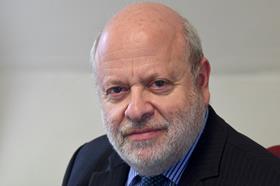Warren Buffett famously said: ‘Only when the tide goes out do you discover who's been swimming naked.’

The withdrawal of nearly all Western support for Russia and Russian money has been one of history’s tide-turning moments, and among those found to be swimming naked have been solicitors. We have been hammered for our servicing of oligarchs whose money was obtained by theft, violence, corruption and other crimes. It is not good enough for us to say that others were at it, too – and that our very own government was knee-deep in the mire. We are solicitors with important values, and should examine ourselves closely in the aftermath.
Having said that, which I believe needs to be said before I turn to others who bear responsibility, I consider that many governments, and intergovernmental organisations like the Organisation for Economic Development and Cooperation (OECD), need to consider their own failings, too.
I want to focus here on the elaborate structure which they foisted on us to stop the servicing of corrupt money – the anti-money laundering laws proliferating around the world. These have failed, too. It is not an exaggeration to say that those laws lie in ruins, having failed to stop the penetration of Western economies by corrupt Russian money.
Yet there seems no recognition that the AML regime is fatally flawed. As with all mistakes, its supporters believe that it was just not applied strictly enough, and needs to be reinforced.
To understand the depth of wrongness of the current AML concept, one need only read Catherine Belton’s book, ‘Putin’s People’, which was published in 2020. This documents in some detail the various criminal dealings which led to the rise of the Russian billionaires whose money flooded the West. She conducted dozens of interviews over many years. Even so, there are large gaps because so much took place behind an impenetrable veil of secrecy, and through multiple layers of shell companies in tax havens which lack transparency.
Yet the OECD, the EU, the UK government and others behind the construction of the AML laws expect every solicitor to conduct his or her own investigation as part of customer due diligence and ‘know-your-client’. The investigation is thus privatised and fragmented, having to be done over and over again by each solicitor or law firm as it is consulted.
Yet the depth of knowledge required – of Russian politics, of the Russian language, of the many varied players, of the multiplying companies and fronts and transactions, of Russian laws, and of historical events – is beyond the resources of a law firm. It is ridiculous to expect law firms to investigate what takes years, many interviews, and much academic knowledge.
It is also a very inefficient way of going about things, because it requires the background to be re-investigated over and over again by separate lawyers and law firms. (I am interested only in law firms, but the same investigations have to be carried out by all players caught by the legislation, all researching the same complex information.) It so happens that there is now a ‘Putin’s People’ to help with Russian investigations. But that stops in 2020, and has understandable gaps. Is there a ‘Putin’s People’ for Kazakhstan, China and whatever other countries fall within the same category?
A system which privatises and fragments the need to research the most complex events imaginable is both inefficient and unworkable. And we have just seen the results: huge compliance departments failed to stops serious penetration of our economies, with dire results.
This has not been a victimless crime: for instance, house prices in London have become unaffordable for many young and less well-off people; political parties have been corrupted by dirty money, with disruption to our political systems; and those trying to bring the truth into the open have been silenced (Catherine Belton herself and her publisher suffered punishing libel claims.
The legal profession made a mistake in its opposition to the laws when they were first introduced. We opposed it on the basis that it made us breach lawyer-client confidentiality through reporting suspicious transactions. We got nowhere with these claims, which were rejected by the courts.
We would have been better off by pointing out that the system being set up, with its requirement for solicitors to investigate complexities and historical events which are beyond reasonable reach, is unworkable, and for them to be re-investigated by each player in the chain over and over again is completely inefficient
The Russian invasion of Ukraine is a turning point for many policies. It should be seen by the OECD and its member governments as an opportunity to examine what went so wrong with the money-laundering system it launched, to the extent that it is now broken, and to construct another which is more realistic and more efficient, dealing with the world as it really is.
Jonathan Goldsmith is Law Society Council member for EU & international and a former secretary general of the Council of Bars and Law Societies of Europe. All views expressed are personal and are not made in his capacity as a Law Society Council member, nor on behalf of the Law Society
This article is now closed for comment.































12 Readers' comments